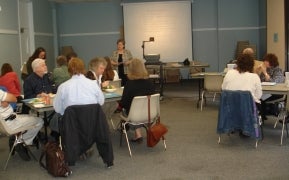
| “When a department makes a new hire at the assistant professor level, it has invested in one of its most valuable resources: a tenure-track faculty position. If the department does not nurture that new professor, it greatly reduces the probability of a good return on that investment. On the other hand, if the department facilitates access to the knowledge and resources required to develop a new faculty member’s career, the payoff is likely to be a valued colleague for many years. If a new faculty member is successful, everyone benefits.” |
Olmstead (2005)
Mentoring has been described as an interpersonal relationship beetween individuals who are at different stages in their professional development (Toal-Sullivan, 2002). Mentors may serve as role models, and act as advisors, guides or advocates in a variety of contexts (Jipson and Paley, 2000).The expectations of those involved in the mentoring relationship will determine the purposes that are served.
An active mentor can contribute significantly to a new faculty member’s development and job satisfaction. The underlying assumption of mentoring as a form of learning and professional development originates from the belief that learning occurs through observing, role modeling, apprenticeship, and questioning (Kanuka, 2005). With women and minorities still underrepresented in some fields (STEM), conscientious mentoring and role modeling is especially critical.
The mentor, the mentee and, as well, the institution realize benefits of good mentoring
 URI Homepage
URI Homepage






